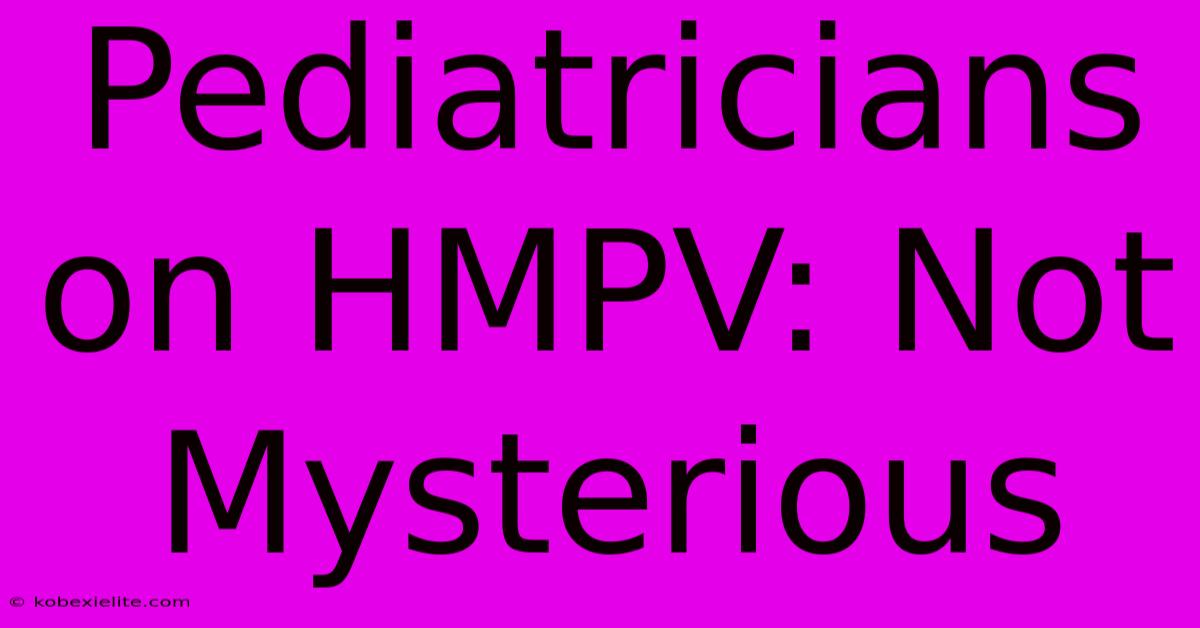Pediatricians On HMPV: Not Mysterious

Discover more detailed and exciting information on our website. Click the link below to start your adventure: Visit Best Website mr.cleine.com. Don't miss out!
Table of Contents
Pediatricians on HMPV: Not Mysterious
Human metapneumovirus (HMPV) might sound like something out of a science fiction novel, but for pediatricians, it's a familiar foe. This common respiratory virus, often mistaken for influenza or RSV, causes significant illness in young children, and understanding its nuances is crucial for effective management. Let's demystify HMPV and explore what pediatricians need to know.
Understanding HMPV: Symptoms and Diagnosis
HMPV is a leading cause of respiratory infections in infants and young children, often presenting with symptoms similar to other viral respiratory illnesses. These include:
- Cough: A persistent cough is a hallmark of HMPV infection.
- Runny nose: Often accompanied by congestion.
- Fever: Moderate fever is common.
- Wheezing: Especially concerning in infants and those with underlying respiratory conditions.
- Shortness of breath: Can range from mild difficulty breathing to severe respiratory distress.
Differentiating HMPV from other respiratory viruses can be challenging, as symptoms overlap significantly with influenza and RSV (Respiratory Syncytial Virus). Diagnosis typically relies on viral testing, such as PCR (polymerase chain reaction) testing, which can specifically identify HMPV. While not always necessary, testing can be particularly helpful in guiding treatment decisions and informing public health surveillance.
HMPV in Infants: High-Risk Groups and Complications
Infants, particularly those under six months old, are at the highest risk of severe HMPV infection. Premature infants, children with underlying heart or lung conditions, and those with weakened immune systems are especially vulnerable. In these cases, HMPV can lead to:
- Bronchiolitis: Inflammation of the small airways in the lungs.
- Pneumonia: Infection of the lungs.
- Hospitalization: Severe cases may require hospitalization for respiratory support.
Early detection and intervention are critical for minimizing complications in high-risk infants. Pediatricians play a vital role in identifying these at-risk infants and providing prompt medical care.
Treatment and Prevention Strategies for HMPV
Unfortunately, there is no specific antiviral treatment for HMPV. Management primarily focuses on supportive care, including:
- Symptom relief: Treating fever with acetaminophen or ibuprofen, using saline nasal spray to alleviate congestion, and utilizing cool mist humidifiers to ease cough.
- Respiratory support: Oxygen therapy or mechanical ventilation may be necessary in severe cases.
- Fluid management: Maintaining adequate hydration is essential, especially in infants who may be dehydrated from fever and respiratory distress.
Preventive measures are crucial in combating the spread of HMPV. These include:
- Handwashing: Thorough and frequent handwashing is the most effective way to prevent the transmission of respiratory viruses.
- Infection control: Practicing good hygiene, such as covering coughs and sneezes, helps reduce the spread of illness.
- Vaccination: Currently, there is no widely available vaccine for HMPV. However, research is ongoing to develop effective vaccines.
The Role of Pediatricians in HMPV Management
Pediatricians are at the forefront of HMPV diagnosis and management. Their expertise in recognizing the signs and symptoms, assessing risk factors, and providing appropriate care is vital in ensuring the best possible outcomes for affected children. Staying updated on the latest research and guidelines regarding HMPV is essential for pediatricians to provide the most effective care. This includes understanding the evolving landscape of diagnostic tools, treatment approaches, and preventative strategies.
Conclusion: HMPV – Understanding and Managing the Common Respiratory Threat
While HMPV might sound complex, its management doesn't have to be mysterious. By understanding the characteristic symptoms, risk factors, and treatment strategies, pediatricians can effectively address this common respiratory virus and minimize its impact on the health of their young patients. Through continued research and vigilant public health measures, we can work towards mitigating the burden of HMPV infections in children.

Thank you for visiting our website wich cover about Pediatricians On HMPV: Not Mysterious. We hope the information provided has been useful to you. Feel free to contact us if you have any questions or need further assistance. See you next time and dont miss to bookmark.
Featured Posts
-
Hmpv Infection Symptoms And Prevention
Jan 06, 2025
-
Kansas City Trash Pickup Blizzard
Jan 06, 2025
-
The Vivienne Passes Away At Age 32
Jan 06, 2025
-
Tom Holland Inspired Zendayas Tattoo
Jan 06, 2025
-
January 6th North Northeast School List
Jan 06, 2025
